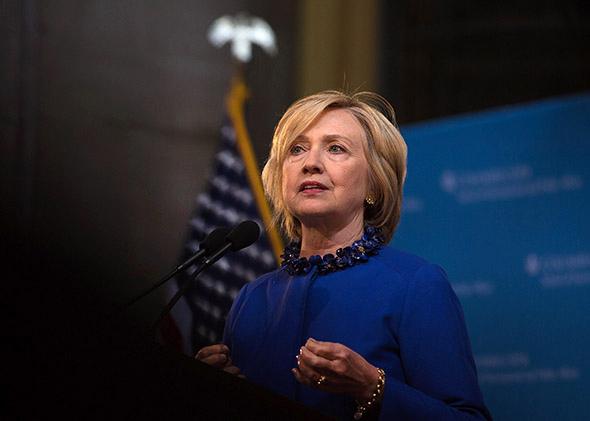Clinton Cash, the much-hyped investigation into Hillary and Bill’s cozy relationship with their global patrons that hit bookstores on Tuesday, contains no smoking gun. Conservative author Peter Schweizer fails to prove that Hillary Clinton’s actions as a U.S. senator and secretary of state were influenced by the massive amount of cash deep-pocketed foreign donors funneled to the Clintons and the foundation that bears their name. What Schweizer suggests is evidence of quid pro quo is instead little more than post hoc ergo propter hoc speculation. As Clinton defenders will rightly tell you, “the rooster doesn’t cause the sun to rise.”
But Schweizer’s failure is also a pretty damning success. He is unable to indict the Clintons, but while trying to he stumbles onto a more important truth: It is impossible to separate money from power in the highest spheres of influence and politics that the Clintons call home. That the two are inextricably intertwined is often shrugged off as simply unavoidable in modern politics, but Clinton Cash offers a needed illustration of what that truism can mean in the real world. That the Clintons can offer no exonerating evidence in their defense only drives the point home further. Schweizer can’t show the Clintons allowed themselves to be influenced by foreign cash, and the Clintons can’t definitively prove they weren’t, for much the same reason; in a political system where the inputs and outputs are both money and power, proof of guilt or innocence simply can’t exist.
This chicken-and-egg conundrum is hardly breaking news. The possibility of favor trading or conflicts of interest hangs over almost every decision in Washington. Does a donor write a check to a politician because their interests overlap? Or do their interests align because the donor cuts that check? Those are impossible questions to answer, but we don’t need answers to know they are worth asking. And for all its flaws—of which there are many—Clinton Cash is predicated on asking.
The Clintons are not responsible for the broken system from which they benefit any more than any other politician who profits from his or her own personal brand. And the zero-sum nature of campaign politics makes looking only at Hillary at this moment in many ways unfair—particularly given Schweizer and like-minded conservatives are more concerned with convicting her in the court of public opinion than having an honest debate about the larger problems illustrated by the Clintons’ sprawling network of friends, allies, and benefactors. However, with the weight of Bill and Hillary’s combined influence—past, present, and future—on matters of U.S. policy, the Clintons are an appropriate vehicle through which to discuss the conflicts of interest that plague our political system.
It’s become common for ex-presidents to cash in on the speaking circuit or launch high-profile foundations after leaving office, but Bill was the first to do so while his wife played a direct role in U.S. policy, first as a senator and then as secretary of state. Such conflicts of interest are only compounded by the fact that Bill is the first former president to have a realistic chance of finding himself back in the White House as first gentleman. To take but one of many, many examples from Clinton Cash and the more even-handed independent reporting that it has prompted: Bill accepted millions of dollars in speaking fees from a number of foreign companies and individuals with interests pending before the State Department while Hillary was secretary of state. That is no longer in dispute. That there’s nothing to suggest the Clintons promised political favors in exchange doesn’t change the reality that no speech is actually worth six-figures all on its own. Even if Hillary were able to separate Bill’s earnings—and the promise of his future ones—from her official actions, the foreign entities cutting those checks would still be, at least implicitly, paying for the appearance of access to a former president and current secretary of state. There’s a reason, after all, that Bill was able to charge more for speaking engagements when Hillary was leading the State Department then he did immediately after leaving office.
That perception of access has real impacts, both in the financial marketplace and the political one, and for the Clintons to refuse to acknowledge that reality is willfully naive at best, and intentionally dishonest at worst. (The couple’s less-than-stellar track record when it comes to matters of transparency only makes these questions more urgent.) But you don’t need to believe the Clintons are guilty of wrongdoing to know that there is something wrong with the system.
In a perfect world we’d hold every politician to account for the conflicts of interest that are unavoidable in our political system. But in the imperfect world we live in we need to start somewhere—and the top is a better place than most. Bill and Hillary Clinton are clearly at the top. They didn’t rig the game, but it is evident from Clinton Cash and the reporting that has already followed in its wake that they’ve come close to perfecting how to play it. They’ve managed to become incredibly wealthy as a result of both the power that they’ve wielded in the past and the promise of the power that they may wield in the future. It is fitting, after all, that in defending the Clintons, their allies are choosing to compare Hillary to the sun, and everyone else to mere roosters reduced to crowing at her.
